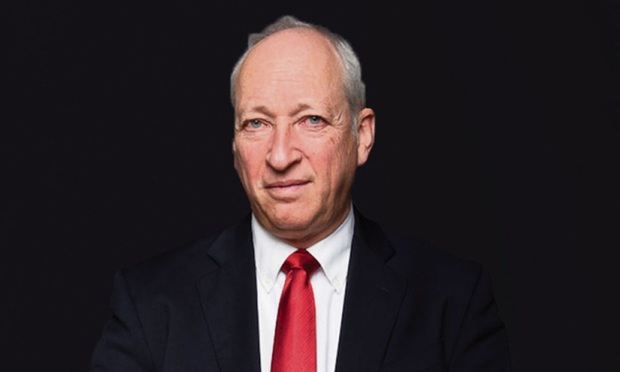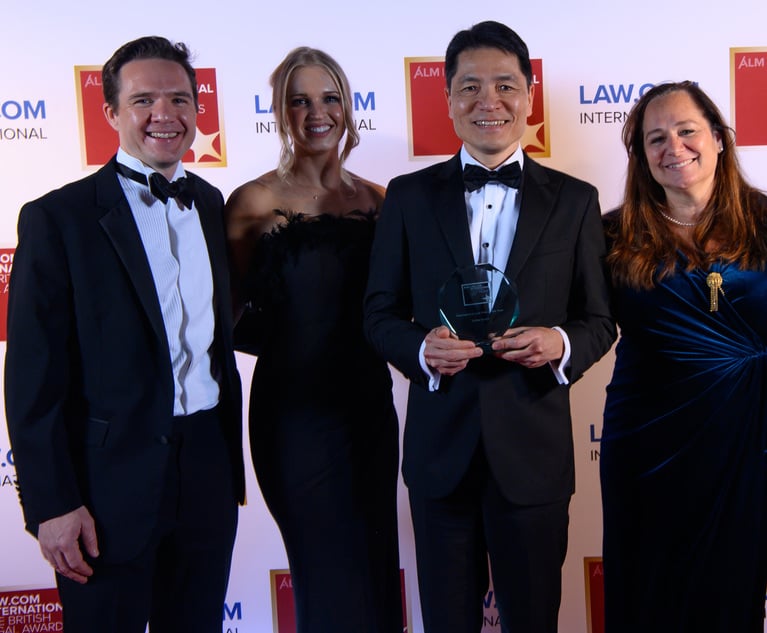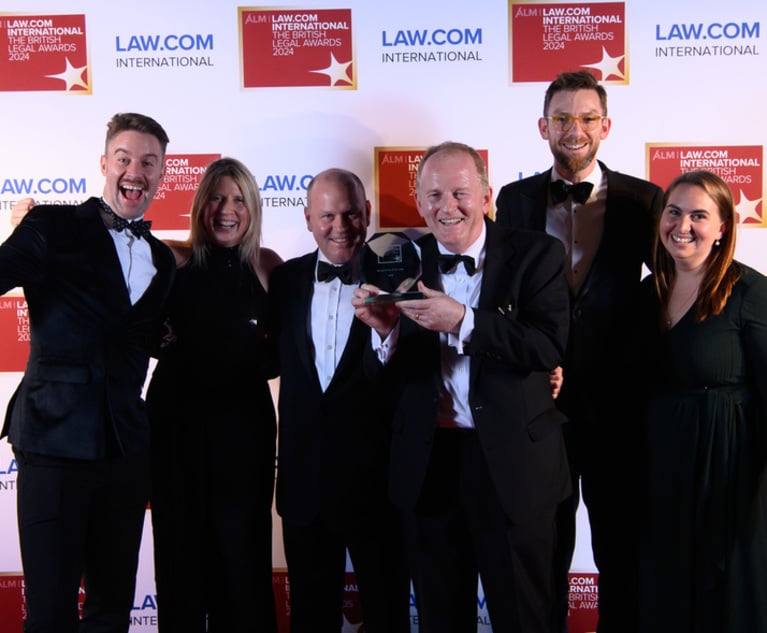Q&A: Nigel Boardman On Retirement, Getting Remarried And Breaking The Law
On the eve of his retirement, the City's star dealmaker reflects on his greatest achievement and most embarrassing episode.
April 08, 2019 at 03:35 AM
4 minute read
 Slaughter and May corporate partner Nigel Boardman
Slaughter and May corporate partner Nigel Boardman
Slaughter and May's Nigel Boardman is the most famous corporate lawyer of his generation. After 46 years of working on many of the U.K.'s most high-profile deals, he retires next month. His clients have included the likes of Shell, Vodafone, BHP Billiton, Reuters, Marks & Spencer, Walmart, Standard Chartered, BAE Systems, Onex, Cable & Wireless, Tomkins, the Rugby Football Union and his beloved Arsenal FC.
He talks to Legal Week about his retirement aims, his proudest professional moment, the most innovative thing in law, and getting remarried.
What do you hope to do when you retire?
As a transactional lawyer you do not have control over your timetable or free time. At any moment you can be called on to get on a plane or a phonecall. I'm looking forward to having more control over my time in the future, which will enable me to plan a broader range of activities than is possible when transactions predominate.
What's your proudest professional moment?
Being involved in the recapitalisation of the banking system in the financial crisis.
What's the worst thing that's happened to you while on the job?
As a young and impecunious lawyer (in those days that was a reality), I was wearing an old suit and the trousers split on my way to a meeting. I had to borrow a stapler to repair the damage – and sit very still throughout the meeting.
What has been the standout deal you've advised on in the last year and why?
Getting married.
What advice would you give to young lawyers starting out?
Volunteer for everything.
"London's financial markets are strong enough to survive the soap opera of Brexit – but it will do some damage"
What are the best and worst things about your job?
Best, working with clients who are world class in their fields and as human beings.
Worst, answering questions from journalists.
How do you expect London to fare as a financial centre in the years following Brexit?
London's financial markets are strong enough to survive the soap opera of Brexit – but it will do some damage.
What's the most outdated thing you've experienced in the industry?
The conveyancing process for real property – every other country seems to have an efficient, sensible system and we have an archaic nonsense.
… and the most innovative?
The use of AI in due diligence.
How many all-nighters do you tend to do per year?
As few as possible.
Have you ever broken the law?
I have had the occasional speeding ticket.
"Every other country seems to have an efficient, sensible system [for property conveyancing] and we have an archaic nonsense"
Why did you become a lawyer?
My father was a country solicitor and I liked the way his clients were always grateful and relieved by his help and advice; it made it clear to me it was a worthwhile profession.
Have you ever regretted the decision?
When I was a couple of years qualified I left and became an investment banker, because I felt being a lawyer was not adding a great deal of value to my clients. I then realised it was my lack of expertise and experience, rather than my profession, which made me less useful – and scurried back to the safety of the law.
Who has been the biggest influence on your career?
There are a large number of people – my parents; former partners at Slaughter and May like Derek Simon, Nick Wilson and Simon Ward; David Clementi, who had the misfortune to be my boss when I made my foray into investment banking; and many clients who shaped the way I think and work.
This content has been archived. It is available through our partners, LexisNexis® and Bloomberg Law.
To view this content, please continue to their sites.
Not a Lexis Subscriber?
Subscribe Now
Not a Bloomberg Law Subscriber?
Subscribe Now
NOT FOR REPRINT
© 2025 ALM Global, LLC, All Rights Reserved. Request academic re-use from www.copyright.com. All other uses, submit a request to [email protected]. For more information visit Asset & Logo Licensing.
You Might Like
View All
International Law Firm of the Year: A Q&A with Sidley Austin's London Managing Partner
5 minute read
Inside Travers Smith's AI Training, Development Efforts

From Olympic Aspirations to Legal Innovation: Tom Dunlop's Journey to Founding Summize
8 minute readTrending Stories
- 1Silk Road Founder Ross Ulbricht Has New York Sentence Pardoned by Trump
- 2Settlement Allows Spouses of U.S. Citizens to Reopen Removal Proceedings
- 3CFPB Resolves Flurry of Enforcement Actions in Biden's Final Week
- 4Judge Orders SoCal Edison to Preserve Evidence Relating to Los Angeles Wildfires
- 5Legal Community Luminaries Honored at New York State Bar Association’s Annual Meeting
Who Got The Work
J. Brugh Lower of Gibbons has entered an appearance for industrial equipment supplier Devco Corporation in a pending trademark infringement lawsuit. The suit, accusing the defendant of selling knock-off Graco products, was filed Dec. 18 in New Jersey District Court by Rivkin Radler on behalf of Graco Inc. and Graco Minnesota. The case, assigned to U.S. District Judge Zahid N. Quraishi, is 3:24-cv-11294, Graco Inc. et al v. Devco Corporation.
Who Got The Work
Rebecca Maller-Stein and Kent A. Yalowitz of Arnold & Porter Kaye Scholer have entered their appearances for Hanaco Venture Capital and its executives, Lior Prosor and David Frankel, in a pending securities lawsuit. The action, filed on Dec. 24 in New York Southern District Court by Zell, Aron & Co. on behalf of Goldeneye Advisors, accuses the defendants of negligently and fraudulently managing the plaintiff's $1 million investment. The case, assigned to U.S. District Judge Vernon S. Broderick, is 1:24-cv-09918, Goldeneye Advisors, LLC v. Hanaco Venture Capital, Ltd. et al.
Who Got The Work
Attorneys from A&O Shearman has stepped in as defense counsel for Toronto-Dominion Bank and other defendants in a pending securities class action. The suit, filed Dec. 11 in New York Southern District Court by Bleichmar Fonti & Auld, accuses the defendants of concealing the bank's 'pervasive' deficiencies in regards to its compliance with the Bank Secrecy Act and the quality of its anti-money laundering controls. The case, assigned to U.S. District Judge Arun Subramanian, is 1:24-cv-09445, Gonzalez v. The Toronto-Dominion Bank et al.
Who Got The Work
Crown Castle International, a Pennsylvania company providing shared communications infrastructure, has turned to Luke D. Wolf of Gordon Rees Scully Mansukhani to fend off a pending breach-of-contract lawsuit. The court action, filed Nov. 25 in Michigan Eastern District Court by Hooper Hathaway PC on behalf of The Town Residences LLC, accuses Crown Castle of failing to transfer approximately $30,000 in utility payments from T-Mobile in breach of a roof-top lease and assignment agreement. The case, assigned to U.S. District Judge Susan K. Declercq, is 2:24-cv-13131, The Town Residences LLC v. T-Mobile US, Inc. et al.
Who Got The Work
Wilfred P. Coronato and Daniel M. Schwartz of McCarter & English have stepped in as defense counsel to Electrolux Home Products Inc. in a pending product liability lawsuit. The court action, filed Nov. 26 in New York Eastern District Court by Poulos Lopiccolo PC and Nagel Rice LLP on behalf of David Stern, alleges that the defendant's refrigerators’ drawers and shelving repeatedly break and fall apart within months after purchase. The case, assigned to U.S. District Judge Joan M. Azrack, is 2:24-cv-08204, Stern v. Electrolux Home Products, Inc.
Featured Firms
Law Offices of Gary Martin Hays & Associates, P.C.
(470) 294-1674
Law Offices of Mark E. Salomone
(857) 444-6468
Smith & Hassler
(713) 739-1250









